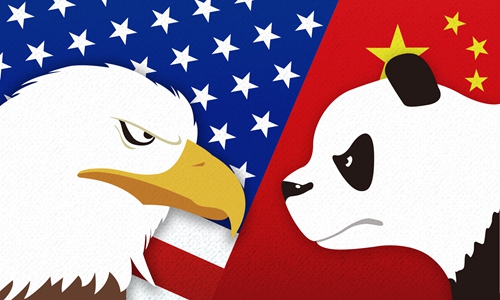HOME >> OPINION
How Trump’s signature can batter China-US relations
By Tang Fei Source:Global Times Published: 2019/11/26 16:58:40

Photo: GT
The vaunted "Hong Kong Human Rights and Democracy Act" awaits US President Donald Trump's nod after having been passed by the US House of Representatives and the US Senate.The bill mandates sanctions on officials from the Chinese mainland and Hong Kong accused of so-called human rights abuses and requires the US State Department to annually review the special status which the US confers on the city in terms of trade. If Trump signs on the dotted line, the bill will be implemented.
However, the enforcement of the law would harm others and bring no benefit to Washington.
It is rare for a bill to be passed almost unanimously in both chambers of the US Congress. Only when the US decided to declare war against Japan after the attack on Pearl Harbor in 1941 did the two legislative chambers show such unanimity.
This implies that almost all US politicians, even the entire US mainstream community, have come together in a bid to contain China.
During former US president Barack Obama's second tenure, this consensus had begun to form among US political circles and strategic think tanks. They thought China's strength did not bring them any benefits in terms of strategic security. China's economy and military have developed rapidly, but its political system has not moved toward the so-called liberalization and democratization as the US had expected. Washington has thus treated Beijing's growing strength as a huge threat.
Several moves, policies and strategies during the Obama administration were designed to contain China, such as rebalance to Asia-Pacific strategy, meddling with South China Sea issue and cross-Straits issues, deploying the Terminal High Altitude Area Defense in South Korea, and embracing the Trans-Pacific Partnership. However, at that time, the entire US society did not forge a consensus to arrest China's advance.
Since taking office, Trump has launched a trade war against China and tried to convince the US public that it is China's economic development that has led to US rising unemployment rate and its loss of economic superiority.
With Trump cranking up populism and US media outlets' biased reporting on China, US voters have started to treat China as a threat.
Members of the Senate and the House are sensitive to public opinion, and are aware of the US public's hostile attitude toward China. It's thus not surprising to see near-unanimous support on the "Hong Kong Human Rights and Democracy Act" in both US legislative chambers as it basically reflects the opinion of mainstream US society.
Trump may be in a dilemma when the bill reaches him. If he refuses to sign it, he tends to go against the whole Congress and public opinion, adding nothing beneficial to his 2020 election. If he signs the act, China-US trade talks would suffer greatly. A trade agreement is essential for Trump to seek a second term. Farmers, who are Trump's hard-core voters, have suffered due to the China-US trade war. Christmas is approaching. Without a phase one trade deal, high prices of agriculture goods will affect the festive spirit and may hurt Trump's reelection chances.
If implemented, the bill would be a big blow to Hong Kong. If the so-called human rights and democracy in the city cannot meet the standards set by the US, the latter may revoke the city's status as a separate customs territory. Investors would think Hong Kong has lost its value as an attractive investment destination.
US interests in Hong Kong would also be influenced. According to statistics from the Office of the United States Trade Representative, US goods trade surplus with Hong Kong was $31.0 billion in 2018. If the city's status as an international financial hub is hurt, US trade surplus with Hong Kong would be affected.
Actually, the US is not concerned about so-called democracy and human rights in Hong Kong. The aim of the bill is to contain China. Washington is hoping to implement US-style supervision in Hong Kong in an attempt to threaten China's sovereignty over the city.
US moves that violate China's sovereignty and interference in China's internal affairs would definitely harm Beijing-Washington relations.
The author is a member of council of Chinese Association of Hong Kong and Macao Studies. opinion@globaltimes.com.cn
Posted in: VIEWPOINT